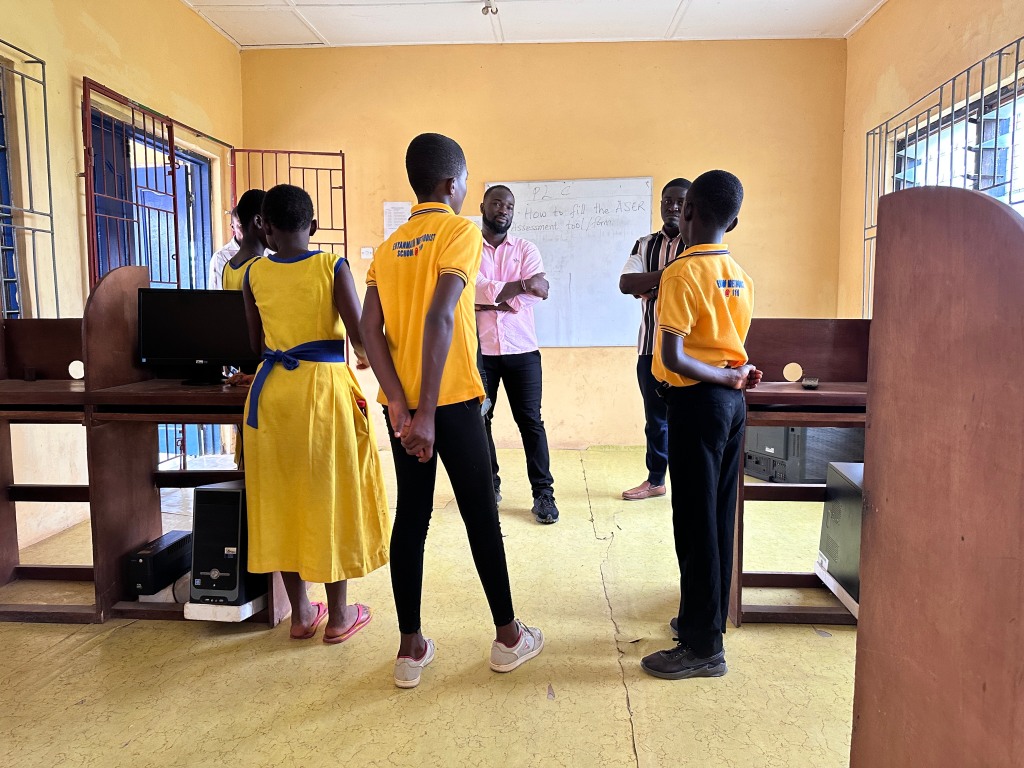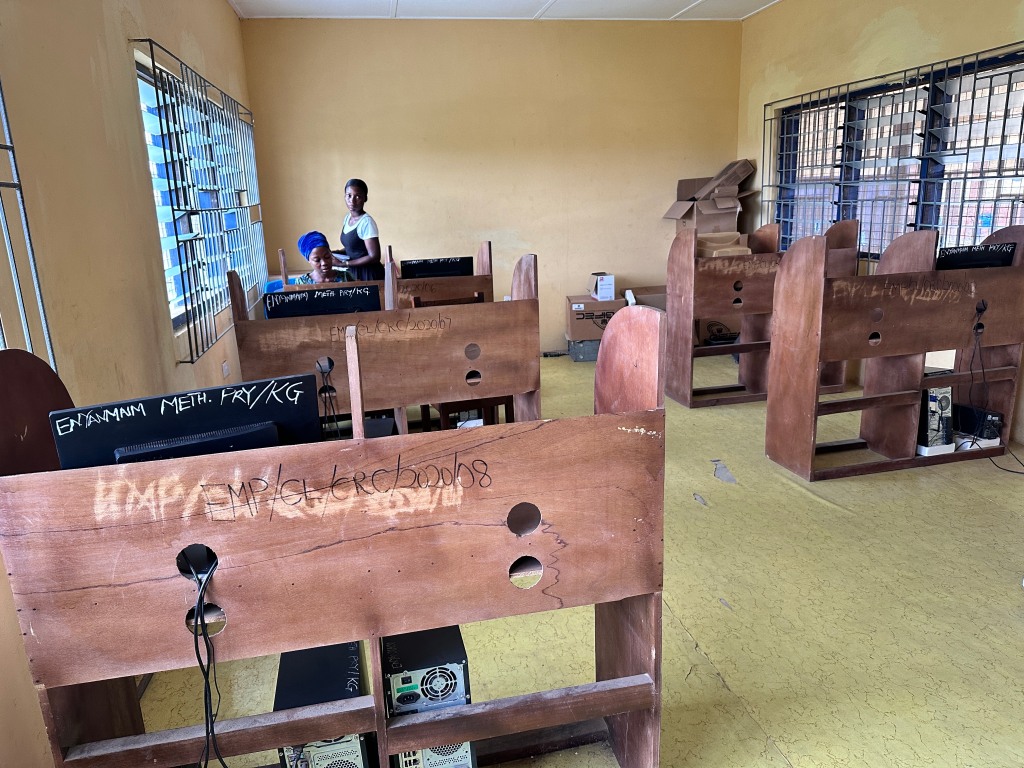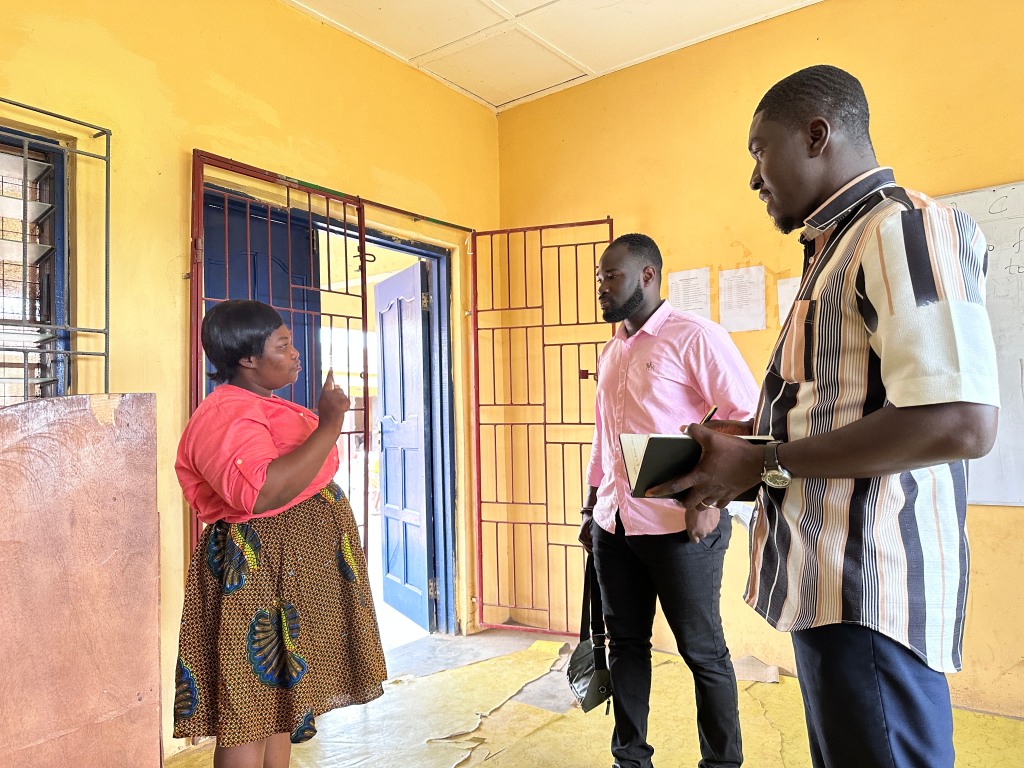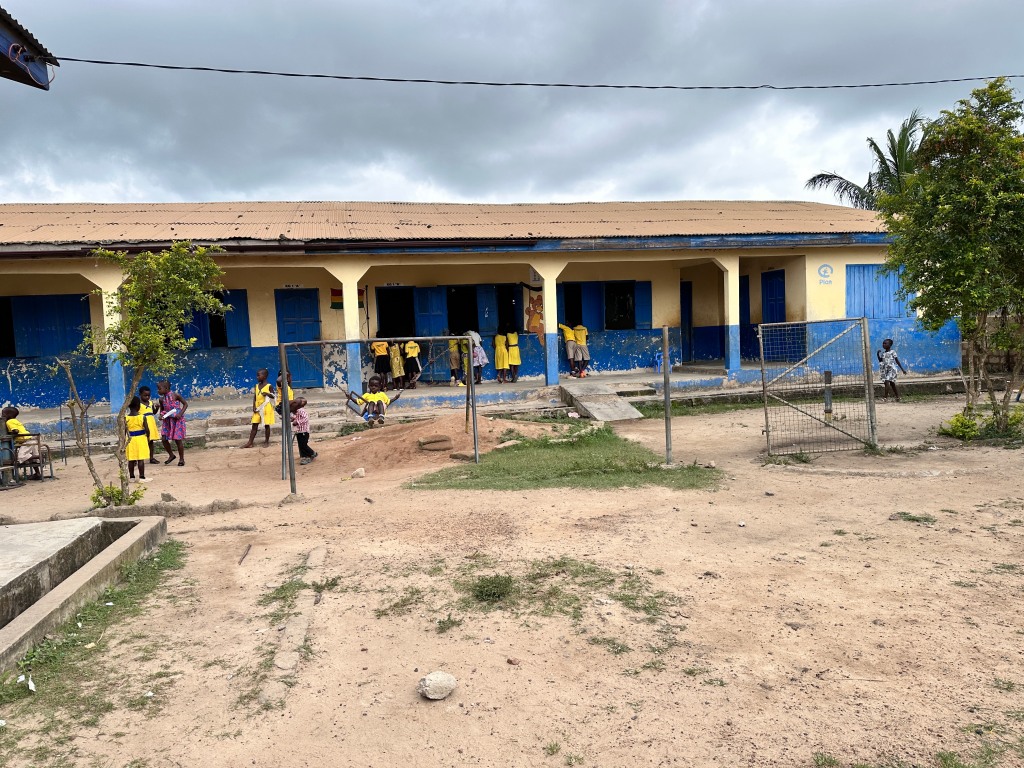I-House Resident Interview Series


Our final Davis Projects for Peace award recipient interview features Eric Assan from Ghana, a master’s student in Education Policy at UC Berkeley. Here are some highlights of our discussion:
Hello Eric! Thank you so much for being here, I’d like to ask you what your Davis Peace Project is about?
Yeah! So the title of my Davis Peace Project is Digital Literacy and Mentorship for Peace. And the purpose of this project is to exude or promote peaceful coexistence among the people who live in a community in Ghana, called the Enyan Maim in the Mfantseman constituency.
So in the year 2024, there’s going to be a national election and, normally in Ghana, what happens is that there are bits and pieces of violence and conflict here and there. But I view that as an educationist that when people are very much educated, they tend to decipher between truth and lies. And most of the time, people follow the lies, leading them to join in violent acts. This is because, normally, when people are educated, they have something to hold on to—they have their work to hold on to, they have their education to hold on to, and they probably have an aspiration to be something in the future to hold on to. And that prevents them from joining in any act that probably does not promote those aspirations to come through. That is where my project comes in. I seek to empower young people in Ghana to be digitally literate, so they can play in the global economy, and for them to assert themselves as responsible citizens of Ghana and of the world as well.
How does this promote peaceful coexistence? I feel like when people are educated and then have jobs to do, they probably will force themselves not to engage in violent acts that can derail their progress in life. That is why this project exists, and I’m hoping that this is something that will impact a lot of the students and the people in the community that I’m going to conduct this project in. So that is my project—to train young children or students to be digitally literate and also mentor them in their educational pursuits.

Thank you so much for sharing! It’s amazing that you’re doing this for your community. I know you already mentioned a little bit about the cultural background of your project. I was wondering if you could tell us more about it and also what inspired you personally to come up with this project?
Yes, thank you very much. So this is the community that I come from—in Ghana, you probably come from where your mother comes from, so that’s where my mother is from, and that is where I also come from. I’ve lived there for a while, and growing up, I didn’t have access to a computer—I didn’t know about a laptop, a desktop, a computer, a projector, a TV screen. So growing up, the first time I used a laptop was when I was an undergrad, and I know that is also the case for many of these students in this community.
So that is what inspired me—coming to Berkeley, knowing that Berkeley had this whole data science ecosystem going on in every department and seeing that when when you go to any department there are computers everywhere. And almost every kid I see around has an iPad, a mobile phone, and an electronic device they are playing with.
That inspired me to give back to my community in a way that helps propel them to also play within the global economy so that they get to a point where they don’t have to meet or be with a computer for the first time in their life in college like in my case. So to try and empower them even from this early age, to come into contact with some of these electronic devices—that is what inspired me to go into this project. And I hope that I can continue to sustain this beyond the period that I’m going to carry out this project—to keep it going and to inspire many more students in Ghana.

Map of the Mfanteseman Constituency | Source: University of Cape Coast Institutional Repository
Wow, that’s really powerful! I hope that this project can be sustained for the young students in your community. This also leads into my next question, which is where are you with your project at the moment, and what do you hope it ends up looking like in the future?
So currently, we are still in the planning stages. I’ve had a field visit, so I’ve done the visibility study. Even since I was writing up the proposal, I’ve had direct contact with the school, but I had not been there in person during the time of the proposal. So I took time when I came to Ghana to visit the school. On three occasions, I’ve been to the school three times, and I’ve spoken to the headmistress, the ICT teacher, and some students who shared their aspirations with me.
I was just talking to the district education directorate where I had to go seek approval officially to have the event in the school. So I’m yet to go see the community leaders because to be able to do an event in Ghana, we believe that there are structures for which things must happen. So even though you have the approval from the school, and then from the district directorate of education, you still need the buy-in of the local people in the community.
So I would say that I’ve done a visibility study, and I’ve seen the first-hand issues with the school, even beyond digital inadequacy, the school itself has a lot of issues. So now I understand a bit more about the challenges the school faces, and we are trying to see how we can best put some of these things in the projects that we do and support them as much as our budget would be able to help them.
That sounds really challenging! Have you faced any obstacles so far in this process to get approval and address the issues that the school you’re working with faces?
So I think a lot of things in the school are weighing on me. Initially, I didn’t set out to do this project thinking that there will be other things for me to also look at, but after going to the school, it was inevitable. I plan to do my event in a rural area, and so the level of development in this area is nowhere near the development in the urban areas of Ghana.
So the challenges are enormous and it’s gonna put a bit of stress on me because the purpose of education is to help train the future leaders of the world. But the students in these rural areas are not able to get the needed infrastructure or resources to even help them to be fully educated, to be active in the global economy, or even assess themselves to make an impact in their own life and in the lives of people.
I think initially it was very stressful, but I think this is not something that we can ignore. The purpose of this project is to establish a foundation that would keep the sustainability of this whole project. And I hope that in the long run, we can create a partnership between the school and any US-based or international-based organizations that can provide constant support for the school. So that is where I find my joy and inspiration to keep moving with this—in that, we can help the school get some computers now, train them digitally to keep it going, and then help address the other issues by continuing the project or assistance from other organizations.

Thank you so much for your answer, I really hope that your project can get the help that it needs to be kept alive in the school that you’re working with. My next question is, how has the impact of I-House helped you with your project and helped you address the obstacles you’ve been facing so far?
Yeah! Living in I-House and being in the US for the first time and having a community of people where I can feel a sense of belonging, feel a sense of community, feel a sense of connection, really made me understand that there there are different people in the world who learn how to be with other different people. There are people who come from the most developed part of the world, and there are others also who come from very underdeveloped parts of the world. So it helped me pick up bits and pieces of these realities, which I believe is even helping me address the issues in the school, because some of the students we spoke to do not have access to computers at all, while others have seen it before, yet, they’ve not touched before.
So I think that living in I-House really broadened my perspective about how life is, especially from meeting people from different countries. I mean, I constantly meet you in the I-House and we have a lot of conversations, talking about issues to do with Japan, and the challenges you face with living in the US and all, and that is the same with other people as well.
So, yeah, I think the sense of belonging and community is helping me in implementing this project, I’m not doing it alone even though I was the only one who applied for it, but it has helped me bring together a team of people who are from different backgrounds and have different perspectives, and we also have ideas as to how to implement the project, what parts to work on, what steps to take, and then what decisions to make as well. So that is what I-House has taught me to be able to implement this project.
I really do appreciate our conversations in the house about our communities and just being able to share our cultures as well. And I’m glad that this is helping you with your project! And on top of that, how do you see I-House impacting your project in the future?
So I think I’ll start by talking about where it began and the initial processes. During the semester, the RCILP department instituted an Impact-athon event, that taught us a lot about design thinking and project implementation and how to even design projects that are “empathetic” to the people you’re implementing the project for. So that was one event that I attended, and it helped me really understand the act of implementing projects and programs that are locally responsive.
And I think going forward, what I hope I-House will do for me and others to continue to sustain our projects will be to constantly train us. The fact that we get to organize an event doesn’t mean that we have all the experience that we need. But if there’s a way to have some sort of refresher course—online courses for us to keep building our expertise—I think that will also help. Additionally, in my case, if there’s an opportunity to seek further funding to address other challenges, I think that would be a great help.
That’s amazing that you were able to take what you learned at the Impact-athon and apply it to your project. And I definitely agree that learning and building skills do not stop once you’re at the project implementation step. On that note, for current I-House residents who may be thinking about creating their own Peace Project, do you have any advice?
Yeah. I think my advice will be that staying in the US can make you think the world is skewed in one direction—that structures work the same everywhere. Because we have it all plugged out—you order things and they come to you, you wanna buy food and you go to a restaurant. You see beautiful structures in I-House, and that is where you live in. But I think that you should also begin to think of the wider world and know that there are people who are living in it. There are people who are living in poverty, in precarious circumstances, and wherever you are you have the opportunity to be in a privileged position.
Always think back to those who don’t have anything, and find a way to make an impact in their lives. So that’s what I would say to current I-House residents—find a way to make an impact in the world. The world is at I-House because we are about 60 countries there, but there is also an outer world in the broader sense of things, find a way to make an impact on the lives of other people. And I think when we all make an impact on the lives of people, the world is impacted.
Thank you so much! That is really good advice! It really is so important to think about the world that’s outside of I-House and learn more about the individual communities that your peers are a part of. So where can we find more information about your project—like a website or social media form that we can help promote?
Currently, I’m trying to address the legal side of things, and so I don’t want to have a social media platform when the organization isn’t legally registered in Ghana. So I’m working on that, and will hopefully have it done by the next few weeks. And then I would do work on their website and social media platforms, hopefully, before the event or the project is implemented. By then, all of this should be up and running and so I’ll share it with you so that you can help with promotion as well!
Awesome! Definitely let me know once you have it ready so we can share it with our global community. Once again, thank you so much again for talking with me about your project. It truly was inspiring to hear about the work you’re doing for your own community. Before we end this interview, I just wanted to check in and ask if there was anything else that you’d like to share with us?
I just wanted to say thank you for checking in with us and for keeping us going. And thank you to I-House immensely for their supposed because, without it, I don’t think I’d be able to even implement this project. So I’m very grateful for this opportunity and I don’t take it lightly. I hope that this project will make a lot of impact on the lives of the people in Ghana, specifically in my community Enyan Maim, as well as the country at large.
Thank you so much! Good luck with the rest of your project and thank you for talking with us again!
Thank you!
[Note: Eric’s first event will happen this Friday, August 11 and photos from his event will be added to this blog post around then! Check back later this week to see how it went!]
Read previous interviews:
Dinah Lawan on Advancing Projects for Peace in Nigeria, and
Martin Ssemulugo on Promoting Hygiene and Sanitation for Peace in Uganda
Learn more about I-House’s annual Davis Projects for Peace Awards.





